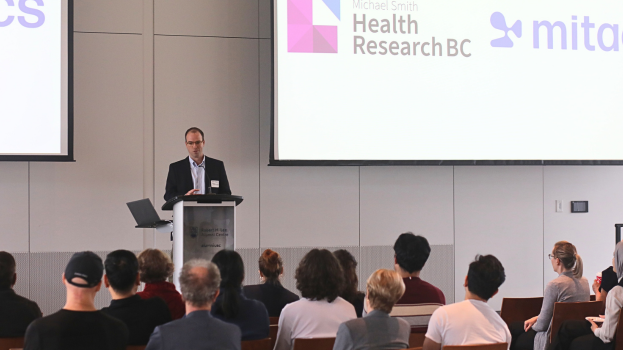Keeping seniors safer from falls
20 July 2021

A simple trip and fall can have a big impact if you are over the age of 75.
Younger adults might get up and brush off their hands and knees – but for those who are older, falls account for 80 percent of head and traumatic brain injuries.
Why is the impact of falling so great for seniors? And what can be done to reduce the chance of falling and, when it does happen, stop seniors from getting hurt?
Dr. Vicki Komisar, assistant professor at the School of Engineering with the University of British Columbia Okanagan campus, has delved into these questions through research funded by an MSFHR Research Trainee award.
A biomechanist by training, Komisar received the Research Trainee award in November 2019 during her post-doctoral fellowship at Simon Fraser University.
During the height of the COVID-19 pandemic, Komisar launched her research project to determine why head injury is so prevalent among falling seniors.
“The research was, at its core, motivated by the importance of generating an evidence base to inform better practice and design for preventing injuries from falls,” said Komisar. “If it allows clinicians to feel more confident in what they are recommending, then I’ll feel I’ve done my job.”
Komisar and the Injury Prevention and Mobility Laboratory at Simon Fraser University reviewed over 3,000 raw videos of seniors falling. The footage was recorded in common areas of long-term care facilities by surveillance cameras, with residents providing consent for use in research.
Among the items studied were what caused the fall, the resident’s landing strategy, what body parts hit the ground or other nearby objects and whether the resident got hurt. The research team also looked at the relationship between a person’s landing posture and their risk for head impact.
“The videos were a very unique repository of high-quality evidence that overcame a lot of limitations of otherwise trying to piece together a falling accident based on an incident report – especially in a population like long-term care residents, where many have dementia and might not even be able to communicate what happened,” explained Komisar.
When younger adults fall, they typically use their arms to slow the movement of their bodies and stop the fall. This might lead to bruising of hands and knees, but heads are unlikely to hit the ground, therefore avoiding head injury.
However, what Komisar and her team found was when people surpass the age of 75 to 80, their arms alone often are no longer capable of stopping falls. This is either because they are not strong enough or because they do not have the range of motion to move their hands into the right position in time.
Another angle Komisar explored was how holding objects affected the risk of head impact for falling. Her team found when long-term care residents fell while holding walkers, chairs or other weight-bearing fixtures, they were two-fold less likely to hit their heads. In other words, even when walkers fail to prevent falls, they still help people fall more safely.
Since receiving the MSFHR Research Trainee award, Komisar has published one paper related to falls in seniors and is in the process of writing another, with the goal of presenting the findings at conferences later this year. She has also published many findings from her post-doctorate and PhD work.
The evidence from Komisar’s PhD research, based at Toronto Rehabilitation Institute, has been integrated into the National Building Code of Canada’s stairway and handrail design and integrated into WorkSafe BC’s slips, trips and falls prevention manual. She is also working to share the evidence with people in clinical positions across Canada to guide their recommendations for patients.
“The funding from MSFHR was really important for giving me the chance to do the research and providing the stability to take the time to plan and execute the clinical side properly,” said Komisar. “Getting my findings into things like long-term care and mobility design standards is really important. Another important part is ensuring that any evidence from my work informs practice, such as clinical recommendations for walking aid use and design of these aids.”
In addition to MSFHR, Komisar’s post-doctorate work was made possible through a partnership with Fraser Health, with additional support from the AGE-WELL Network of Centres of Excellence Postdoctoral Awards in Technology and Aging, a Canadian Institutes of Health Research Community Support Travel Award, and a MITACS Accelerate Fellowship with industry partner Rheon Laboratories (London, UK).
The MSFHR Research Trainee Program supports health researchers in the training phase of their research career to enable career development and enrich BC’s health research talent.
The Research Trainee Program is one of MSFHR’s flagship funding opportunities. Since 2001, MSFHR has granted more than 1,400 Research Trainee awards worth approximately $60 million, helping to develop, attract and retain BC’s best and brightest health researchers and support the advancement of world-class health research in BC.
Learn more about MSFHR’s Research Trainee Program.





